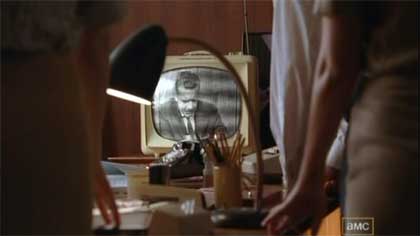 If you've recorded, but haven't yet seen, last Sunday's episode of AMC's Mad Men, don't read any more of this column until you've watched the episode. It contains surprises too potent to spoil - but too artistic and well-handled, on the other hand, not to celebrate. So if you HAVE seen it, read on, as I praise Matthew Weiner's series for playing its hand magnificently...
If you've recorded, but haven't yet seen, last Sunday's episode of AMC's Mad Men, don't read any more of this column until you've watched the episode. It contains surprises too potent to spoil - but too artistic and well-handled, on the other hand, not to celebrate. So if you HAVE seen it, read on, as I praise Matthew Weiner's series for playing its hand magnificently...
When the current season of Mad Men began, one of the most anticipated secrets to be revealed aboutthe show's 1960s world was exactly what date it was. Was the show coming back before the assassination of John F. Kennedy, or after? Would Weiner, perversely, skip over one of the most tragic and significant events of that decade, or build up to it as the season progresssed.
We learned instantly that, in the Madison Avenue world of Mad Men, the unforgettable date of Nov. 22, 1963 was still in the future. But then, all this season, Weiner and company did something impressive. They made us forget that the tragedy might be coming.
And, in the most amazing magical feat of all, they managed to sneak it up on us and stun us with it, just as people were stunned in 1963. Advance promos of the episode on American Movie Classics revealed no hint of it. Nor did publicity photos, advance TV log-line descriptions, or anything else. In short, Mad Men took its biggest plot point of the year, and kept it secret, in an age when almost NOTHING is kept secret any more.
And my, was it a fabulous TV viewing experience as a result. So much to remember. So much to love. So much to praise.
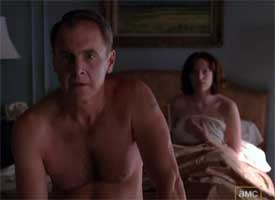
I love, for example, that Mad Men didn't take the obvious approach of showing only Walter Cronkite, whose CBS reporting we now see as synonymous with JFK assassination coverage. Instead, the first image we saw, as folks from Sterling Cooper turned on their TV at work, was NBC's Chet Huntley.
And we got to see the reactions of many major characters as the news developed. Peggy, still flush with the thrill of illicit afternoon sex with a colleague from a rival agency, was stunned.
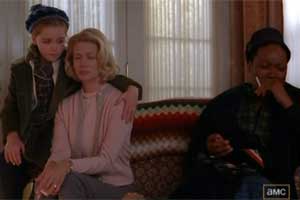 Betty Draper cried when she first saw the news, then, witnessing Lee Harvey Oswald's shooting on live TV, screamed in anger, demanding to know what was happening. Then she fled the room -- leaving Don, whose secrets she had discovered the episode before, as well.
Betty Draper cried when she first saw the news, then, witnessing Lee Harvey Oswald's shooting on live TV, screamed in anger, demanding to know what was happening. Then she fled the room -- leaving Don, whose secrets she had discovered the episode before, as well.
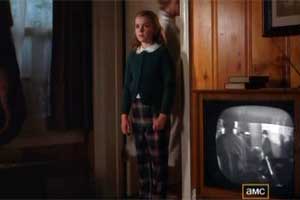
The master stroke of the episode, though, was another continuation of a plot thread from a previous episode. Peggy and Don had been among those working on a new campaign for Aqua-Net hair spray, and the approved campaign, which we had seen illustrated in storyboards, had two couples driving in a convertible.
One woman wore a scarf to protect her hair from getting mussed by the wind. The other -- the Aqua-Net user -- needed no such protection, and enjoyed the open-air ride with giddy abandon. Excellent campaign -- until, the Monday after the JFK assassination, Peggy and Don, the only two people who came in to work on a national day of mourning, looked at the storyboards and saw two couples in a convertible... an eerie, uncomfortable echo of the last TV images of the presidential limousine driving through Dallas before JFK was shot.
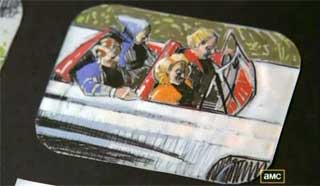
When I saw those Aqua-Net images the first time, the Kennedy connection never occured to me. When the camera closed in on them in Sunday's episode, those same images took my breath away. Matt Weiner had played his cards extremely close to the vest, yet let us peek at them at the same time. That episode was a major payoff, and a master stroke of TV direction. And misdirection, too, because we never saw it coming.
This Sunday at 10 ET is the season finale. Is there any question it's an hour not to be missed?